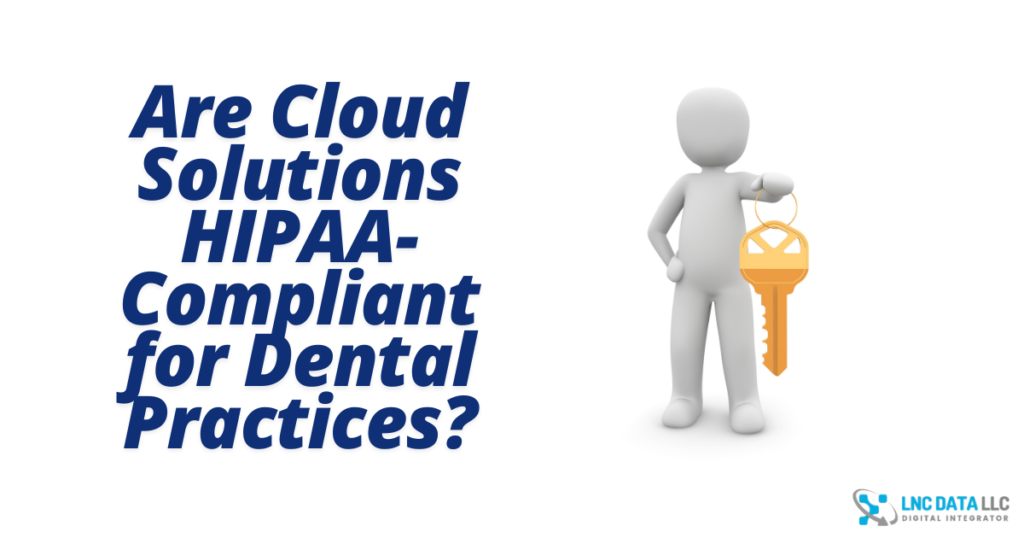
Are Cloud Solutions HIPAA-Compliant for Dental Practices?
Being HIPAA compliant is mandatory for dental offices, but using technology is also mandatory. A common question every dentist wants to know is “Are Cloud Solutions HIPAA-compliant for Dental Practices?”
So, should you consider cloud computing in your dental office?
Dentists are covered entities so according to HIPAA rules, it is their responsibility to protect the health information of patients.
Yes, cloud solutions are HIPAA-compliant for Dental Practices if correctly implemented.
As a dentist, you can use HIPAA-compliant cloud services for keeping electronic health records. Security of the electronic health records stored in cloud services is highly dependent on the IT infrastructure of the dental clinic.
Whether you are using a cloud storage service or not, you must ensure that you are following the rules to protect patient information. It also reduces the risk of trouble if your computer’s electronic health records ever get hacked.
Here are some tips on how to reach compliance by fulfilling the HIPAA requirements.
Trusted Security Responsibility
Dentists are responsible for protecting their patients’ information because they are considered a covered entity by HIPAA compliance rules. The first step to ensure HIPAA compliance is to assign IT responsibility to someone on your staff who knows about cybersecurity and understands it. If you do not have any trained employees who know about cybersecurity, immediately hire one. They will make HIPAA compliance much easier for you.
Risk Analysis
A HIPAA requirement is to assess risks specific to dental offices. While risk assessment is mandatory for HIPAA requirements, a gap analysis is also important, and HIPAA insists that dental clinics should strongly consider performing a gap analysis with regard to all the physical, administrative, and technical control requirements. By performing risk and gap analysis simultaneously, you can find out the largest gaps and risks. You can also strategize to protect your data according to the analysis and minimize all the threats in advance.
Administration Security
You need to create and document a plan to secure patients’ PHI. Administrative security means a dental office needs to create clear policies and procedures for securing electronic health records. These policies may include permissions for accessing information, procedures for granting access, and the storage location of electronic health records. An important part of administrative security is an incident response plan to handle any cybersecurity attacks and breaches. This plan ensures the office takes immediate action and notifies the necessary parties, as required by the Breach Notification Rule. Acting swiftly and effectively helps protect the office from penalties under the OCR’s Enforcement Rule in case of a breach or complaint.
Physical Security
Along with online protection and cybersecurity procedures, HIPAA also requires physical security as unauthorized individuals could also be the cause of security breaches. Physical security means that dental clinics should only give PHI access to authorized individuals through workstations, facilities, or media controls. Controlled access to workstations, devices, dental office networks, and sensitive media ensures security.
Technical Security
Technical security is designed to prevent unauthorized electronic access to electronic health records (EHRs). This aspect of security can be complex, as it requires a thorough understanding of computer systems, applications, and networks to strengthen the system and eliminate vulnerabilities. To ensure the system is properly secured, hiring a penetration tester, someone who acts as a hacker is essential. Their role is to identify and fix weaknesses, preventing “bad” hackers from easily accessing the office’s network, systems, and data.
Conclusion
Ensuring the security of electronic health records (EHRs) requires enforcing multiple controls. While storing data in the cloud can be a cost-effective and secure solution, dental offices should not assume they are compliant with the Privacy and Security Rules simply because EHRs are stored in the cloud. Hackers often view most cloud services as secure and well-protected, so instead of targeting the cloud directly, they are more likely to exploit vulnerabilities in a dental office’s network. A common tactic involves gaining access to an insecure device used to access cloud-based EHRs, stealing login credentials, and using them to download records.
If you’re unsure whether your office network is secure or if your HIPAA program meets the Security Rule requirements, visit lncdata.com for a free consultation. The security experts at Professional Consulting Services & Solutions LLC are dedicated to helping you secure your systems and supporting you on your journey to HIPAA compliance.